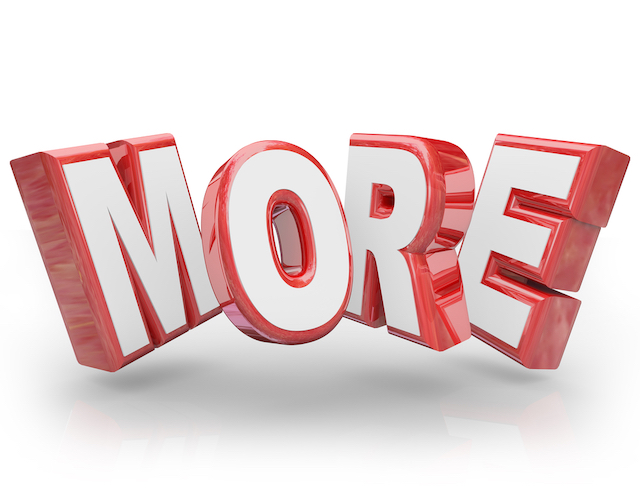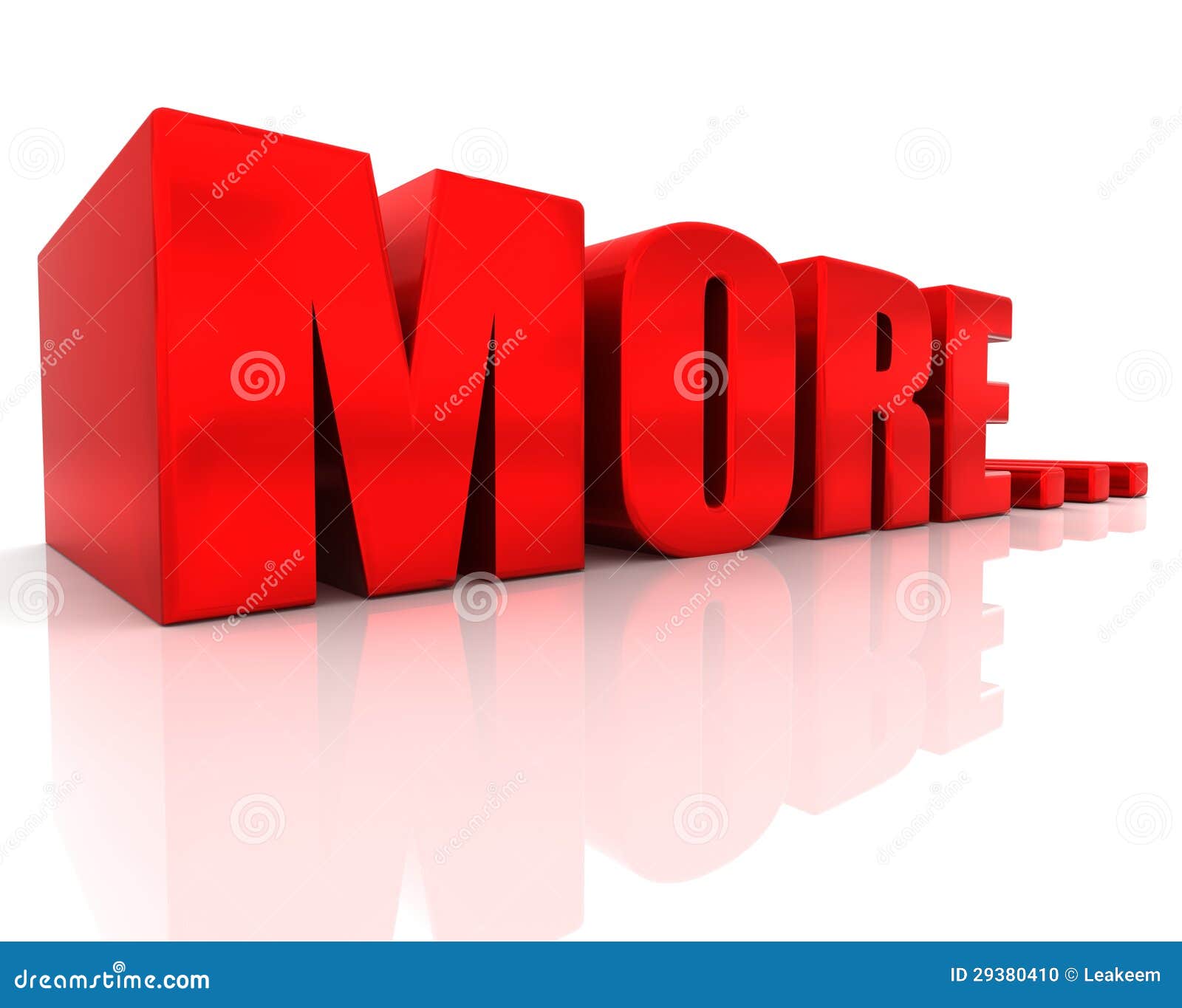The English word "more" appears deceptively simple. It’s a single, versatile term we use to indicate greater quantity, higher degree, or additional items. However, when transitioning this concept into French, learners quickly discover a rich tapestry of words and constructions, each with its own nuances, grammatical rules, and contextual applications. From the ubiquitous "plus" to the subtle "davantage" and the emphatic "encore," understanding how to express "more" in French is crucial for fluency and precision.
This article will embark on a comprehensive journey through the various ways "more" is conveyed in French, dissecting each term, providing examples, and highlighting the subtle differences that can make or break a sentence’s meaning. We will explore not just the primary translations but also their usage in comparisons, negations, and idiomatic expressions, ultimately equipping you with the knowledge to wield "more" with confidence and accuracy.
The Cornerstone: "Plus" – The Multifaceted Workhorse
At the heart of expressing "more" in French lies the word "plus." It is by far the most common and versatile translation, but its usage comes with specific grammatical rules and, crucially, a variable pronunciation that often trips up learners.
1. "Plus" for Quantity (More of Something)
When referring to a greater quantity of a noun, "plus" is almost always followed by "de" (or "d’" before a vowel), irrespective of the noun’s gender or number. This structure is akin to "more of something."
- Structure:
plus de + noun - Examples:
- J’ai besoin de plus de temps. (I need more time.)
- Il y a plus de voitures sur la route aujourd’hui. (There are more cars on the road today.)
- Elle boit plus d’eau en été. (She drinks more water in summer.)
2. "Plus" for Comparison (More… Than)
"Plus" is central to forming comparative sentences, indicating a higher degree of an adjective or adverb.
- Structure:
plus + adjective/adverb + que - Examples:
- Cette voiture est plus rapide que l’autre. (This car is faster than the other one.)
- Il parle français plus couramment que moi. (He speaks French more fluently than me.)
- Le soleil brille plus fort que hier. (The sun is shining more strongly than yesterday.)
When comparing verbs, the structure changes slightly:
- Structure:
verb + plus que + noun/pronounorverb + plus que + verb - Examples:
- Elle travaille plus que son frère. (She works more than her brother.)
- J’aime lire plus que regarder la télévision. (I like reading more than watching television.)
3. "Plus" for Superlative (The Most)
To express "the most" (the highest degree of an adjective or adverb), "plus" is combined with a definite article (le, la, les).
- Structure:
le/la/les + plus + adjective/adverb - Examples:
- C’est la plus belle ville que j’aie jamais vue. (It’s the most beautiful city I’ve ever seen.)
- Il est le plus intelligent de sa classe. (He is the most intelligent in his class.)
- Nous avons choisi l’option la plus chère. (We chose the most expensive option.)
4. The Crucial Pronunciation of "Plus"
This is where "plus" becomes a notorious challenge for learners. The ‘s’ at the end of "plus" can be pronounced or silent, depending on the context.
-
Silent ‘s’ (pronunciation: /ply/):
- Before a consonant: C’est plus difficile. (It’s more difficult.)
- In the negative construction "ne… plus": Je ne veux plus de café. (I don’t want any more coffee/I no longer want coffee.)
- When "plus" stands alone meaning "no more": Plus rien ! (Nothing more!)
- When "plus" means "more" but is followed by "de" + noun, often implying "no more" or a general lack: Il n’y a plus de lait. (There is no more milk.) (Here, it’s negative, so ‘s’ is silent).
- When it’s part of a phrase like "plus ou moins" (more or less): Plus ou moins.
-
Pronounced ‘s’ (pronunciation: /plys/):
- When "plus" means "more" in an affirmative comparative context, especially when followed by a vowel sound: C’est plus intéressant. (It’s more interesting.) (Here, the ‘s’ links to ‘intéressant’ and sounds like a ‘z’).
- When "plus" stands alone meaning "more" or "in addition": Deux plus deux font quatre. (Two plus two makes four.)
- At the end of a sentence when "plus" means "more": Je veux en savoir plus. (I want to know more about it.)
- In mathematical contexts: Trois plus un. (Three plus one.)
The general rule of thumb: If "plus" is affirmative and means "more," the ‘s’ is often pronounced, especially before a vowel or at the end of a phrase. If it’s negative ("ne… plus") or signifies a lack/cessation, the ‘s’ is silent. Practice and listening are key to mastering this distinction.
The Nuanced Alternative: "Davantage"
While "plus" is the general-purpose "more," "davantage" offers a more refined and often elegant alternative. It exclusively functions as an adverb, meaning "more," "further," or "to a greater extent."
-
Key Distinctions from "Plus":
- Never followed by "de": Unlike "plus de," you cannot say "davantage de."
- Never followed by "que": It cannot be used directly in comparisons like "davantage que."
- Often stands alone or modifies a verb: It typically appears at the end of a clause or directly after a verb.
- Implies a general increase: Often suggests "more" in an unspecified way, without a direct object following it.
-
Examples:
- J’ai besoin de travailler davantage. (I need to work more/further.)
- Il faudrait y réfléchir davantage. (We should think about it more/further.)
- Elle veut en savoir davantage sur ce sujet. (She wants to know more about this topic.)
- Les étudiants devraient lire davantage. (Students should read more.)
"Davantage" is particularly useful when you want to express "more" in an absolute sense, without specifying what "more" of, or without making a direct comparison. It can sometimes sound more formal or sophisticated than "plus."
The Reinforcer: "Encore"
"Encore" primarily means "again" or "still," but it frequently translates to "more" when implying continuation, addition, or repetition of an existing quantity or action.
-
"More" as in "still more" or "yet more":
- Tu veux encore du café ? (Do you want more coffee?) – Implies you’ve already had some.
- Il reste encore beaucoup à faire. (There is still much more to do.)
- Donne-moi encore un peu de gâteau. (Give me a little more cake.)
-
"Even more" (often combined with "plus"):
- C’est encore plus difficile que je ne le pensais. (It’s even more difficult than I thought.)
- J’ai encore plus faim après avoir couru. (I’m even hungrier after running.)
Expressing Progression: "De Plus en Plus"
To convey the idea of something increasing continuously, or "more and more," French uses the idiomatic phrase "de plus en plus."
- Structure:
de plus en plus + adjective/adverborde plus en plus de + noun - Examples:
- Il fait de plus en plus chaud. (It’s getting hotter and hotter / more and more hot.)
- Les gens sont de plus en plus conscients de l’environnement. (People are more and more aware of the environment.)
- Il y a de plus en plus de monde dans cette ville. (There are more and more people in this city.)
The Negative Aspect: "Ne… Plus"
The negation "ne… plus" means "no longer," "not anymore," or "no more." It signifies the cessation of an action or the absence of an item that was previously present. Remember that the ‘s’ in "plus" is silent in this construction.
- Examples:
- Je ne fume plus. (I no longer smoke / I don’t smoke anymore.)
- Nous n’avons plus de pain. (We don’t have any more bread.)
- Elle n’habite plus ici. (She no longer lives here.)
It’s crucial not to confuse "ne… plus" with "ne… pas" (not). "Ne… pas" simply negates an action or state, while "ne… plus" indicates that something that was happening or was present is no longer the case.
Additional Expressions and Nuances
Beyond the core terms, several other phrases and words contribute to expressing "more" in various contexts:
-
"De plus": This phrase means "moreover," "furthermore," or "in addition." It acts as a discourse marker to add information.
- Il est intelligent ; de plus, il est très travailleur. (He is intelligent; moreover, he is very hardworking.)
-
"Beaucoup plus" / "Bien plus": These translate to "much more" or "a lot more" and serve to intensify "plus."
- C’est beaucoup plus cher que je ne pensais. (It’s much more expensive than I thought.)
- Ce livre est bien plus intéressant que le film. (This book is much more interesting than the film.)
- Bien plus often carries a stronger emphasis or a more qualitative difference than beaucoup plus.
-
"Plutôt": Meaning "rather," "instead," or "more likely," "plutôt" implies a preference or inclination towards one thing over another, often with a sense of "more" in that direction.
- Je préfère rester à la maison, plutôt que sortir. (I prefer to stay home, rather than go out.)
- Il est plutôt grand pour son âge. (He is rather tall for his age.)
-
"Trop": While meaning "too much" or "too many," "trop" is inherently about an excessive quantity of "more."
- Il y a trop de bruit ici. (There is too much noise here.)
- Tu as mis trop de sucre dans mon café. (You put too much sugar in my coffee.)
-
"Qui plus est": An elegant phrase meaning "what’s more" or "and what is more."
- Il a réussi l’examen, qui plus est, avec brio. (He passed the exam, and what’s more, with flying colors.)
-
"À plus forte raison": This translates to "all the more reason" or "even more so."
- Si c’est difficile pour nous, à plus forte raison ce sera difficile pour eux. (If it’s difficult for us, all the more reason it will be difficult for them.)
Common Pitfalls and Tips for Learners
- Pronunciation of "Plus": This cannot be stressed enough. Actively listen to native speakers and practice pronouncing "plus" correctly in different contexts. When in doubt, mentally ask yourself: "Is this negative?" or "Is it a standalone affirmative ‘more’ at the end of a phrase?"
- "Plus de" vs. "Davantage": Remember that "davantage" is an adverb and does not take "de" + noun or "que." If you need to specify what there is more of, use "plus de." If it’s a general "more" modifying a verb or standing alone, "davantage" is a good option.
- "Encore" vs. "Plus": Use "encore" when "more" implies "still more," "yet more," or a continuation/addition to something already existing. "Plus" is for general quantity or comparison.
- "De plus en plus de" vs. "De plus en plus": Ensure you use "de" after the first "plus" when followed by a noun (e.g., de plus en plus de monde).
- Context is King: The best way to master these nuances is through exposure. Read French books, watch French films, and listen to French conversations. Pay attention to how native speakers use these terms.
Conclusion
The journey from the simple English "more" to its multifaceted French counterparts is a testament to the richness and precision of the French language. While "plus" serves as the primary and most versatile option, its variable pronunciation and specific grammatical structures demand careful attention. "Davantage" offers a refined alternative for general increase, while "encore" introduces the idea of continuation or additional items. Furthermore, expressions like "de plus en plus," "ne… plus," and a host of idiomatic phrases add layers of meaning that are essential for accurate and eloquent communication.
By diligently practicing these distinctions, immersing yourself in French media, and paying close attention to context, you will gradually unlock the ability to express "more" with the naturalness and accuracy of a native speaker. Embrace the complexity, for it is in these nuances that the true beauty of the French language lies.


